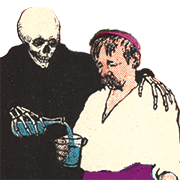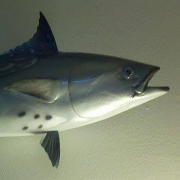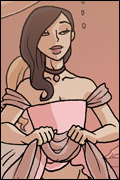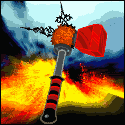|
CodfishCartographer posted:I really like the idea of the non-urgent threats all piling on top of each other to create one gigantic clusterfuck of panic. Each one being kind of an inconvenience at best makes it all the more hilarious when it all piles up to create a massive catastrophe.
|
|
|
|

|
| # ? May 15, 2024 22:03 |
|
JMBosch posted:The metagame goals pretty much stay the same (survive until you can take out all the threats), but the emotions and narrative that unfold as the game plays is one of increasing desperation of the hunters as their confidence and power gets undermined by a menacing, unseen threat. The slasher movie aesthetic works really well here, to bring it back around.
|
|
|
|
JMBosch posted:Following this lead and what oxidation said, you can structure it where everyone, hunters and monster, starts out strong, and doesn't get any stronger, but it's the hunter characters who progressively get weaker, or in worse of a situation, as the game continues and the monster takes more actions. It would add to the fear and feelings of insecurity in the hunter players to start out super confident in powerful armor with big guns, walking around a brightly lit, well-functioning ship/station/whatever looking for some nuisance, and then after every turn, the monster causes something else to go wrong. The metagame goals pretty much stay the same (survive until you can take out all the threats), but the emotions and narrative that unfold as the game plays is one of increasing desperation of the hunters as their confidence and power gets undermined by a menacing, unseen threat. This was basically exactly what I was going for. No one ever gets actually weaker or stronger, but the number of options and actions available to the hunters decreases over time, and there's a real sense of impending doom and desperation. Round 1, they might have a small fight with the creature / a creature, but it's fine, because the med bay is fully functional. By round 10, all the doctors are dead and there's no more power in the med bay and there's only one half-used first aid kit left.
|
|
|
|
I played feint wars again, this time with a rat-men swarm build (the idea is put as many cheap units on the field at once), and though you only get 4 activation to spread between all the units, it did seem overly powerful because of extra HP on the field. Not sure how to resemblance this, though it seems to indicate HP is under-costed. . Also it feel like there's quite a bit to keep track of in this game.
|
|
|
|
I was loosely inspired by the conversation last week. I just finished making the first playable version (because I am eternally optimistic that I will find people to actually play my drat games) and now I wanted to mention it. Ah, essentially, assume that after a big space battle there's a fair amount of salvage to be had. So the players are a four-man independent salvage team who've boarded a derelict with the intent to limp it to a nearby station to register the claim. The players aren't the only ones who know about the derelict, so there's a race to get the claim registered before someone with guns gets there to take it away. Thing is, not everyone on the salvage team might necessarily be on the level, but it'll be hard to tell what's sabotage and what's just a battleworn ship falling apart around you. Right now I haven't even written down the rules in a coherent form (mostly just diagrams), and the event deck is too drat unwieldy so I'll need to play it so I know how best to trim it down. Playing a game that basically requires four people is a real challenge though. I also left an extra victory condition and associated systems off this first playable since if the simple version doesn't work the more complicated one sure as hell won't. Mostly I just thought the thread would be sort of amused that some idle chatter inspired a little game, even if it isn't totally what they were talking about. And it still needs a name. Maybe "Trampled Rose." Hmmm.
|
|
|
|
By "not all the players being on the level" do you mean there's a hidden traitor, or some players might have more malicious victory conditions than everyone else? Or do players have opportunities to be dicks to each other for various benefits? I have no idea if this is what you want but typing this out makes me think a system where players could choose to be traitors partway through would be cool. Like you CAN work together, but everyone has the option to go rogue as a risky way to steal victory for themselves as opposed to the whole team.
|
|
|
|
CodfishCartographer posted:By "not all the players being on the level" do you mean there's a hidden traitor, or some players might have more malicious victory conditions than everyone else? Or do players have opportunities to be dicks to each other for various benefits? I couldn't think of a good reason thematically to have the players try to screw each other over overtly. It's ostensibly a cooperative game after all. I guess the vision is for the players to be working so hard at keeping the ship pointed in the right direction and full of air that losing is a legitimate concern even before you account for the idea that someone's trying to lose. Later I'll add back in the ability to control sections of the ship, which will happen automatically as your character repairs what breaks either through deliberate action or the natural tendency for the ship to fall apart. This allows for "control" victories, which I'm still struggling with a narrative reasoning for but I think will add some variety. Hopefully tomorrow I'll be able to do some no-traitor test runs and see how difficult the rules as written are. From there I suppose it's time to start writing things down.
|
|
|
|
The motivation for the traitor might be that all the players are working for MegaCorp X, but one player is a spy working for MegaCorp Y, and the ship they're salvaging is worth billions and his job is to make sure MegaCorp X doesn't get it. I've only ever played 3 hidden traitor games (The Resistance, Shadows over Camelot, and Betrayal at House on the Hill -- plus dozens of Mafia games), but how are you going to mechanically handle the hidden traitor?
|
|
|
|
oxidation posted:The motivation for the traitor might be that all the players are working for MegaCorp X, but one player is a spy working for MegaCorp Y, and the ship they're salvaging is worth billions and his job is to make sure MegaCorp X doesn't get it. quote:I've only ever played 3 hidden traitor games (The Resistance, Shadows over Camelot, and Betrayal at House on the Hill -- plus dozens of Mafia games), but how are you going to mechanically handle the hidden traitor? The idea being here that you know things are going to go wrong but if you keep seeing the same things going wrong you've got to start wondering. There's no guarantee any one particular player's sabotage will take effect. I'm looking for more of a cumulative recognition. The more I think about it the more I think the "control sections of the ship" mechanic that I haven't made the pieces for yet is going to be necessary. Without the trail of subsystems in a player's color it'll be very difficult to nail down who's trying to shut down the engines or who's spending a little too much time at Nav.
|
|
|
|
I love the idea of becoming a traitor via opportunism: you could make it a co-op where the players share the sale value of anything they successfully bring back in one piece, but anyone could split off a bit and take the risk of piloting that section by themselves and not split the reward. Bonus points if they can sabotage or devalue the main section before breaking off. That would fit a space hulk scenario wonderfully, and I'd laugh my arse off if I could sever a tiny section while my friends were trapped inside, frantically trying to fix it. Basically, giving players the decision would be a much more interesting way of implementing traitor mechanisms than flat out roles, and allowing the group as a whole to incentivise or threaten would make for some really cool decisions. The Supreme Court fucked around with this message at 17:39 on Jul 5, 2015 |
|
|
|
Poison Mushroom posted:Somewhere between dissatisfaction with unavailability and reported poor quality of Fury of Dracula, and my having played far too much Ironcast recently, I have an idea for a game. A hidden movement game with a combat mechanic, but with a very important twist. I'm catching upon this thread so this is from a while ago but I like this idea & your natural fit to Alien. Two things that I really like include games in which there is a "gear shift" like for example a gradual inversion of what is effective at the start versus at the end (the other being - Gutter Owl said it well: random elements that become deterministic once they hit the table.)
|
|
|
|
Re: hidden traitors and their motivations. It made me reflect on whether there's any value in players all potentially being traitors, but in a triggered sense. Like, we all know that one person who's a great friend, would give you the shirt off their back but don't get between then and money (or between them and a boy/girl, or whatever) because you will become An Enemy who has Betrayed them. I guess BSG kind of does this in some way. I wonder if it could be leveraged more somehow in a useful & intuitive way that would add to gameplay.
|
|
|
|
The Supreme Court posted:I love the idea of becoming a traitor via opportunism:
|
|
|
|
Casnorf posted:I like it too, and spent the last few days figuring out how to do it. Finally succeeded, I think. If Events are just opportunities then why not put your objectives in there too? Fulfill the conditions on an Event card and you win alone. If it doesn't come up, well, the moment just wasn't right and no one is the wiser. Cooperative victory is always available.
|
|
|
|
Poison Mushroom posted:I like the core of it, but it's just a touch too binary. Either you get a chance to be a traitor, or you don't. It might work better if instead your "loyalty" card was "hey, here's how you could win by being selfish. You know, if you want to. You can always play nice, but man, doesn't that big working-condition hyperdrive look expensive?" Yeah, I like the idea of each player having their own secret personal win condition, and of course there being a win condition for the entire team. Being careful to make that win condition a possibility at multiple stages throughout the game will probably be important. You can have some be more geared towards early or late game, but you’ll need to be careful not to have too many that’ll totally get locked out form being able to be completed - the longer the option is there, the more tempting it’ll be. 
|
|
|
|
Honestly, I think the operative phrase here, something to keep coming back to while designing, would be "crime of opportunity". If there's no temptation to suddenly go selfish, what's the point of playing a game where everyone's a potential traitor?
|
|
|
|
Poison Mushroom posted:Honestly, I think the operative phrase here, something to keep coming back to while designing, would be "crime of opportunity". If there's no temptation to suddenly go selfish, what's the point of playing a game where everyone's a potential traitor? Why does anyone traitor in a one-shot game? The plan is to have the option and temptation there at all times, and easier to accomplish later in the game.
|
|
|
|
This suggests having a way to open players up to the opportunity to blackball or at least isolate other player(s) from certain elements out of caution or knowledge that it's one of their, uh, "weak points". Like the way people doing a con or a heist don't let anyone hold the money to bring back & split up later, that's just common sense because let's face it the temptation would be just too much. So everyone keeps a hand on it so to speak until your share is safely in the bag then you mug Jack on his way to his car because he's alone and take his share too The Eyes Have It fucked around with this message at 04:08 on Jul 8, 2015 |
|
|
|
Mister Sinewave posted:This suggests having a way to open players up to the opportunity to blackball or at least isolate other player(s) from certain elements out of caution or knowledge that it's one of their, uh, "weak points". This makes me think though a game based on the first scene of the Dark Knight could be cool. Be the last clown alive. 
|
|
|
|
I think to make a really good opportunistic traitor game you need to give the players their own scoring criteria. Instead of it being "If X, you win the game" I think it should be more like "X is worth 2 Points for you, when it would normally be worth 1." Space Ships keep coming up as a theme so lets look at how you could do that. At the start of the game each player gets a Motivation card, which is modifiers to the base scoring rules. The point of the game is to go on missions that all reward you as a ship in different ways. Maybe the base scoring is something like: pre:Battle Win +1 Money +2 Supplies +1 Alliance Heat -1 pre:Simon Motivation Battle Win -1 Money +3 Supplies +3 Alliance Heat -2 pre:Mal Motivation Battle Win +1 Money +0 Supplies +0 Alliance Heat +2 Now the issue is deniability. Battle Star Galactica handles this via the Destiny Deck, the randomized cards that are added to skill checks so that players attempting to sabotage have some ability to lie about it. Honestly the BSG system is so good I'm getting stuck trying to think of something you'd replace it with! I think I would stick very close to that system. I think maybe adding some negative cards that aren't actually the color you draw them from would add a little bit more tension and wiggle room for newer players, something like 'Events' that are randomly assigned to piles at the start of the game. Thinking about it, maybe you could even replace the Destiny Deck with an Event Deck and have each Mission tell you how many cards to add to it? I dunno that's a lot of words! TL;DR - I think Opportunistic Traitor games need central win conditions, and that a Betrayal should be more of a natural out cropping of your scoring causing you to value things differently.
|
|
|
|
That's cool, and I really like differing values causing traitors naturally through gameplay. I'm doing a bit of work on a space hulk game based on the stuff I wrote above, and have gone for a simpler option. The end score for each player is the value of the bit of hulk they successfully steered home and, if people are still sharing bits of hulk, the score is split equally between them. That way there's incentive to group together for a large chunk of hulk, but there's always the option of splitting off your section and taking the risk of going it alone. Everyone (5ish?) will start on the same large space hulk, with valuable bits and useful stuff (like engines, weapons) distributed across the hulk. I'm thinking basically Galaxy Trucker co-op: get a multi-part wreck through a series of challenges in space. That said, I really like the valuation system and it might be cool to have roles that value differing components more: say an engineer will be much more invested in the chunk of ship that has engines, or a reactor or something, while a mercenary could want the weapons bits. Might be a good source of strife! The Supreme Court fucked around with this message at 17:45 on Jul 9, 2015 |
|
|
|
I found your post very interesting  Misandu posted:Now the issue is deniability. Battle Star Galactica handles this via the Destiny Deck, the randomized cards that are added to skill checks so that players attempting to sabotage have some ability to lie about it. Honestly the BSG system is so good I'm getting stuck trying to think of something you'd replace it with! I think I would stick very close to that system. Dark Moon does a thing where you roll dice as a action-generation sort of thing like Alien Frontiers. You then contribute dice to different events/jobs/crises. The deniability is that of course anyone could simply roll lovely and be forced to contribute only "bad" dice. I haven't played but that's a different approach and I've heard it works well for Dark Moon.
|
|
|
|
Dark Moon's dice system sounds cool. I'm thinking of implementing a similar "crisis" style problem to the ones above (like BSG), where you've got to focus on multiple ship components (decided by "minor problem" draws) in one turn. It'd involve playing numerical cards face-down onto the component. Like Dark Moon, some cards would be negative and players would probably be forced to play negatives at some point due to hand size. The twist would be that "minor problems" don't do anything until later. The cards remain face down until someone either checks the pile (taking their whole turn?) or there's a crisis of that component, at which point you flip the cards over and discover if someone's hosed the team or not.
|
|
|
|
The Supreme Court posted:The twist would be that "minor problems" don't do anything until later. The cards remain face down until someone either checks the pile (taking their whole turn?) or there's a crisis of that component, at which point you flip the cards over and discover if someone's hosed the team or not. I like that idea. And I presume that as in real life, it's impractical to check up on or audit everything. This vaguely reminds me of one of the things I liked about Robinson Crusoe - the fact that small decisions now can lead to big impacts later. Decide to eat some berries you found in the woods? Well gain 1 food or whatever but now somewhere in the deck is a card that - if it resolves - makes you sick as a result. Maybe you'll get hit by it, maybe you'll luck out and nothing happens but it's in the pipeline. Or you hurt your hand but if you don't have (or don't use) medical attention then it might wind up infected later. But "infected hand" isn't even at all possible unless you first decided not to attend to the wound when it happened. Anyway I like the idea that minor things truck along fine and you don't resolve the "crisis" and its contributions until the relevant component is stressed in some way or whatever.
|
|
|
|
The Supreme Court posted:Dark Moon's dice system sounds cool. I was trying to figure out a working system for something like this and I think Mister Sinewave just gave me what it needed! Okay so what if the board is a bunch of discreet locations like Engine Room, Communications, Weapons, etc. Each turn you draw some cards and have to assign them, face down, to the locations. When an event/crisis/whatever requires use of that Location you take all the cards assigned to it, add some random ones, shuffle them up, and reveal them. Most cards are stuff like "Operating Normally: +1 Towards Success" but you would have some more complicated stuff mixed in there too. Maybe you have cards that just straight up count for more when they're drawn like "Well Maintained: +3 Towards Success" or "Backup Generator: +2 Draws." Then of course you would have sabotages, either straight up "-1 Towards Success" or something like "Wear and Tear: -1 Draws." The idea here is that you contribute your cards to potential skill checks ahead of time. You could also include stuff like inspections where you get to look through the cards at a Location and maybe toss some out, or repairs which let you remove persistent cards (like maybe the Wear and Tear card from above) on your turn. You have to be proactive though, because once poo poo hits the fan and you need to rely on that Location the cards are shuffled making it hard to determine who actually contributed what.
|
|
|
|
The key question to me is: will a player value an objective purely on availability?
|
|
|
|
Casnorf posted:The key question to me is: will a player value an objective purely on availability? What do you mean?
|
|
|
|
Misandu posted:What do you mean? What I'm trying to do (and think I've succeeded at, though playing the drat game will tell for sure) is create an organically shifting series of opportunities, with some player influence in what opportunities to win alone exist, and some impetus to keep the players working together as well. This brings me back to an earlier question: Why does anyone turn traitor in a one-shot? If the answer is "different values," and you can create differing values through the actual availability of objectives, then I might be on to something.
|
|
|
|
So I'm tinkering with my co-op heist movie game again and I have a bit of a money problem. See, while the ultimate, immutable goal is to breach and enter the bank vault and then leave the building with bags full of money and without handcuffs slapped on your hands, there are some possible locations where it makes a lot od sense to grab some additional  , e.g. the iconic act of holding up of the cashiers. Come on, you cannot leave the cashiers out as an option in a bank heist! The thing is, I'm at a bit of a loss at how to make this extra cash matter. , e.g. the iconic act of holding up of the cashiers. Come on, you cannot leave the cashiers out as an option in a bank heist! The thing is, I'm at a bit of a loss at how to make this extra cash matter.- Under no circumstances should the extra cash constitute an alternative win condition (meaning enough  laying around so that the players do not have to bother with the vault at all), bacause the game structure would kinda fall apart. laying around so that the players do not have to bother with the vault at all), bacause the game structure would kinda fall apart.- An obvious thing is to make it the extra feelgood VPs (like Space Alert's window), but it's kinda  and nobody ever cares and risks team's neck for these in my experience. and nobody ever cares and risks team's neck for these in my experience.- A way to make extra VPs matter is making the entire thing a semi-coop, where everyone strives to end the job with the biggest possible share of the loot for themselves, but I'm not sure I want to follow this path 1) just because 2) as it may work out or not. - I try to think of a way to make extra cash be a way to somehow make achieving the main condition easier. For example, gold straight out of vault clogs up your hand (the game will have a sort of mageknighty card-based task resolution), constraining your options on the way back, while the extra :bux: weight nothing and can bring you up to the required amount of loot, equal to full vault capacity. - Alternatively, maybe during heist planning (simplified deck construction after seeing final bank areas layout) some options could involve more efficient tools that require you to grab extra cash during the heist itself to "break even".
|
|
|
|
While this video is about a video game rather than a board game, it is about heists and getting the feel of them correct, so it may be of value to you: https://www.youtube.com/watch?v=cUbyNJKsi7E Anyways, since you're planning for the game to be coop, my very first instinct is that money could be used as a resource you spend while on the job. If players will be using cards for various things throughout the game, having them pay for those cards with money could be a very easy way to get them picking cash up - make the cards fairly expensive compared to their starting money, so that after 1-2 cards they'll need to pick up  . Then that cash will only be enough to fund maybe 1-2 more cards, forcing them to pick up more and more. . Then that cash will only be enough to fund maybe 1-2 more cards, forcing them to pick up more and more. Also just gunna throw this out there: As someone who designed a coop game that he eventually turned into a semi-coop game, semi-coops are waaaaay easier to make engaging and fun and exciting  Please keep going with pure coop as there aren't nearly enough great coop games, but just keep in mind that you'll need to work harder for it. Please keep going with pure coop as there aren't nearly enough great coop games, but just keep in mind that you'll need to work harder for it.
|
|
|
|
This might not be in the spirit you're looking for but maybe taking time out to e.g. empty the donation for sick kids jar / hold up the cashiers could be undesirable. Like, you're working together to do the job but you all have personalities that constantly hanker to get more than their fair share of, well, anything. This means you are bank robbers, but it also means that the temptation to take a minute to empty the tip jar for a measley  when you SHOULD be watching the hostages might be an interesting game element to juggle. when you SHOULD be watching the hostages might be an interesting game element to juggle.
|
|
|
|
Maybe you have to give most of the vault loot to the planners/bosses but extras like robbing the customers/cashiers is all yours.
|
|
|
|
I feel like writing more words on coop game design since we’re on the topic so HERE WE GO The main issue with designing cooperative games is that their end states are very binary. Generally everyone wins, or everyone loses. There’s no such thing as coming in 2nd or 3rd place, or being one point away from winning instead of your backstabbing friend, or even Victory Points in general. Some coop games like Zombicide DO have a gradient for their loss conditions, such as losing two or three teammates before achieving victory, but generally winning is an all-or-nothing thing. This causes the problem of making any task that doesn’t directly push your team toward victory seem pointless. Competitive games suffer from this less, as there are many more options for achieving victory, as you only worry about yourself. Say your strategy in a game is to hang back and gather resources - this may be completely different from how everyone else wants to play the game, but you personally see the value in doing this from your own perspective. Maybe you don’t plan on using those resources, but they’re worth VPs at the end of the game and you’re fairly certain you can gather the resources faster than players can get VPs via other methods. Maybe you plan on using those resources to purchase a giant war machine to murder everyone. The point is, YOU get to make YOUR decision, and then you can work to achieve that. As a designer, it’s way easier to implement these kind of options and tools since you can reward VPs for so many different kinds of actions and strategies - balancing them might be a pain in the rear end, but at least you can have those options there. The second issue with designing cooperative games is keeping the tension ramped up. In a comp game, players do a lot of this for the designer. People just like beating their friends at stuff! They get personally invested in the game as they’re personally invested with the people they’re going up against. Cooperative games provide a setting for people to get invested in one another, but their primary antagonist is the game itself, which is harder to get invested in the struggle against. This is why basically every cooperative board game is very difficult - people love an underdog and feeling like they’ve overcome a massive challenge. The challenge brings the tension that is lost by not having your friends to compete against. How would we make this work in a coop game? Having a VP goal could be possible, and just give various options to reach that goal within a strict time limit or very possible loss conditions to create tension. Then you could create multiple avenues for the team as a whole to reach those VPs. A lot of cooperative games do this, but disguise it in various ways. Pandemic is essentially earning VPs, but instead of working up towards a goal number of VPs, you’re working down towards getting rid of all of the VPs (viruses). If you look at eliminating viruses as earning VPs, then you basically have a goal VP value (however many viruses are on the board), a way of earning VPs (removing viruses), a way of losing VPs (viruses being added to the board), and everyone is trying to earn those VPs together. If a VP coop system is done well enough, then each player has their own methods and strategies to working towards achieving that goal. Players might even compete against each other a bit to see who can earn VPs for the team the fastest. Another popular victory condition for coops is having hardset goals. When X thing happens, the players win. Then the tension comes from trying to accomplish the goal(s) within the game’s time limit, or trying to accomplish the goal(s) without hitting a loss condition. In Space Alert, the goal is simply to Not Die until the time limit hits. Samurai Spirit is basically the same - keep protect so many villagers for so many rounds and you win. Many of Zombicide’s scenarios have various goals that the players need to achieve, and when all of them have been completed then the players are victorious. In these games, the goals are the primary objectives, and everything else in the game serves to get the players to obtaining those goals. Flexibility in strategies in these games can be more difficult, as everything needs to progress towards the players’ goals in some way. Furthermore, it can be difficult to allow players opportunities to do their own thing, as the group will generally decide “this is how we should get to the goal” and then that’s that. For your heist game, it sounds like VPs aren't really something you could go with, so going for a goal-based victory might be best. I assume, based on your theming, that you want players to steal the motherload and then escape in one piece? In this case, you probably have two goals the players NEED to accomplish in order to win: 1) Open the vault. 2) Escape with the loot. My first instinct on how to add variety to this setup would be to add more goals, that differ for each player. Maybe each player has a role that has its own goal - and each player needs to complete their goal in order for everyone to win. You can make some of these individual goals “mandatory” to achieving overall victory - such as The Driver role’s goal would be “Pile all surviving thieves into the getaway car, along with the loot”, The Safecrack’s goal would be “break into The Vault and get the loot in your inventory”, etc. Other roles could have more “optional” goals that tie in to the theme without directly being about stealing the main haul - The Crook’s goal could be to steal X$ from around the bank, The Gun’s goal could be to defeat Y number of security guards / cops. You could design these goals to ensure players are naturally keeping within the theme as much as possible. Sorry for all the words, this wound up a lot longer than I initially intended. Hopefully Broken Loose can comment on some of this, since he’s actually designed a full-on cooperative game.
|
|
|
|
My first thought: You need an exact amount of money to win, and you're not guaranteed to get it from the vaults. Maybe you're all in deep to a loan shark, and you need the amount in full by tonight if you want to keep your kneecaps. The vaults are full of cash (you'll need to pop at least one to win), but they're hard to break into and time consuming. And some of the deposit boxes are full of people's random poo poo--patent documents, car titles that are useless without the car, someone's Beanie Baby collection that's going to be worth a fortune any day now, just you wait. Meanwhile, the cash registers and pocketbooks are all small change, but they're easy to access, and can fill in the crucial last thousand or two.
|
|
|
|
quote:The main issue with designing cooperative games is that their end states are very binary. Generally everyone wins, or everyone loses. There’s no such thing as coming in 2nd or 3rd place, or being one point away from winning instead of your backstabbing friend, or even Victory Points in general It's easy to make a co-op game with VP - look at, say, Hanabi. More co-op games should have VP, as it helps with balancing. On that subject, a simple way to address co-op balancing (and one that's been tried a lot lately) is to make the game semi-coop, and have some tension between helping the group and helping yourself. This sounds OK in theory, but once you think things through you see it's the coop equivalent of making your multi-player game very political. It's very easy to balance a semi-coop or political game because players will be incentivized to do the balancing for you. Unfortunately, both of these approaches normally end in a terrible game where those mechanisms override anything else going on. I'm sure we've all played enough "very political" games to know how that crap ends; and once you've seen enough of them you realize that it doesn't come down to individual game design problems, the consequences are baked into the approach. Back to semi-coops, first off, most semi coops don't really function as semi-coops. Oftentimes there won't be much tension between your own goals and the groups, and you're left with either (in the case of a "group wins dominate") a competitive game that has crappy mechanics, or (in the case of a "group losses dominate") a co-operative game that is frustratingly hard. But those aren't even the worst possibilities; the worst possibility is that your semi-coop works and that everyone is incentivized to play chicken with group failure. If you actually make a "real" semi-coop, where players are choosing between helping themselves and helping the group stay afloat, the group should be losing almost every game. The players behind on individual scoring should be contributing essentially nothing in an attempt to force leaders to ignore their individual goals (and this should be starting early and going hard). If players aren't doing that, then the game doesn't have enough mechanics to really support semi-coop play (ie. players aren't making significant choices between helping the group and helping themselves), there's not enough state for the game to meaningfully exist over many turns (ie. you don't have significant choices past a point where you can see you're behind), or the game is too random or too unclear for players to take these choices (ie. you've taken the "hidden VP" solution to the political gaming problem, which trivially works but usually effectively replaces political luck with randomness luck). Co-op games aren't terrible because it's a doomed archetype, they're terrible in practice because designers are lazy and there are legitimate challenges to solve that require real work: 1. Managing difficulty. I know some people like Flashpoint, but to me it epitomizes the problem with most co-op games. If you had an actual opponent playing the other side (and if you were on a reasonable difficulty setting), you'd always lose. Meanwhile, if you controlled the fire spawns you'd have no trouble winning. In practice, you have a game where your skill and choices represent a small signal piggy-backing on a wildly fluctuating luck rollercoaster. (There's other problems with Flashpoint, but this is the key one). Other, better co-ops suffer much less from this problem. Ghost Stories is hard and rewards skill, but it's more notable in that it presents a very consistent challenge (too consistent for its own good, sometimes, as the game can start to feel samey once you've got a good plan - but at least the puzzle was good while you're figuring things out). I think the core answer here is to rely less on randomness for "opponent" behavior - or at least constrain the randomness into a narrower band. You want an opponent that's taking good moves, not randomly poor and excellent ones (especially with no guarantee it won't mostly take one or the other). 2. Rewarding actual player co-operation. Obviously your game pieces do a lot of co-operating in many co-op games, but too often the players are not really required to co-operate at all. Everyone is playing the whole game, and agency is just arbitrarily divided among people (with the option of quarterbacking to override). The clearest test for this is "how much would this game change if you played it by yourself". For many terrible co-op games, the answer is "not really at all". But for the strongest co-ops, the answer is, "the game doesn't even make sense" (eg. Hanabi) or "it wouldn't be the same at all" (eg. Space Alert). The innate positives of a co-op game (everybody winning is great) have tricked people into accepting a lot of terribly designed games. But there's no reason these games can't be as mechanically solid as the best competitive games - it just takes a designer willing to accept some legitimate challenges. Edit: On the safecracker game, maybe you could have the money functional later in the mission? Like, you can bribe people, or hand out money to civilians to make them view you different, or give money to henchmen so they stay loyal... or even buy more supplies mid-mission? These break with "realistic simulation" to a variety of degrees, but maybe something there might work. jmzero fucked around with this message at 21:53 on Aug 18, 2015 |
|
|
|
jmzero posted:1. Managing difficulty. I know some people like Flashpoint, but to me it epitomizes the problem with most co-op games. If you had an actual opponent playing the other side (and if you were on a reasonable difficulty setting), you'd always lose. Meanwhile, if you controlled the fire spawns you'd have no trouble winning. In practice, you have a game where your skill and choices represent a small signal piggy-backing on a wildly fluctuating luck rollercoaster. (There's other problems with Flashpoint, but this is the key one). Other, better co-ops suffer much less from this problem. Ghost Stories is hard and rewards skill, but it's more notable in that it presents a very consistent challenge (too consistent for its own good, sometimes, as the game can start to feel samey once you've got a good plan - but at least the puzzle was good while you're figuring things out). I think the core answer here is to rely less on randomness for "opponent" behavior - or at least constrain the randomness into a narrower band. You want an opponent that's taking good moves, not randomly poor and excellent ones (especially with no guarantee it won't mostly take one or the other). I think Space Alert fundamentally does the same as many other co-ops in this respect where opposition to the players as a group is still just a stretched-out random or pseudorandom "puzzle". Space Alert simply imposes time limits and information overload to make the usual ways of playing impractical. This can either/both evidence of how much a single mechanic can change how a game plays and feels, or as evidence that under the hood Space Alert really has far more in common with other co-ops than it might seem.
|
|
|
|
quote:I think Space Alert fundamentally does the same as many other co-ops in this respect where opposition to the players as a group is still just a stretched-out random or pseudorandom "puzzle". Space Alert simply imposes time limits and information overload to make the usual ways of playing impractical. I agree - Space Alert doesn't have a particularly great answer on difficulty (which is wildly inconsistent, we've had some missions where we whiffed a bunch of stuff and survived and others where we would have needed to be perfect)... but whatever imperfections it has are mostly smoothed over by pacing and overall quality.
|
|
|
|
Ok, I think I have an idea how to go about the  question. question.I started by trying to break the problem down to its basics. Why do I need the cash to be around? How many reasons are there to want it in the first place in addition to self-explanatory useful items laying around (e.g. a spare guard uniform). The answer is, naturally, that it makes sense for some areas thematically (how the gently caress is the room with the cashiers named?) and would be a shame to leave out for thematic reasons (the cashiers, mostly). That led me to think, how about stopthinking about the cash as a token/object, and more as an ability/trait/whatever of a particular area. Now the simplest way that I hope would not break apart due to scaling to the number of players is to make grabbing all the cash on the map (if it's on the board, it's notable enough to be a part of the plan), period. The idea being that it presents another form of obstacle: instead of being a room presenting the players with additional problems (e.g. guards, paths blocked by seriously time-consuming lockpicking, etc.) it presents an additional objective, a forced waste of time and resources, drawing them away from what would be otherwise an optimal way to deal with the vault & escape. The cashiers in particular would work nicely in the semi-random layout I'm going for, as they could be a "Main Entrance" tile for the entrance row that is super-obviously a much bigger pain in the rear end than all the other options, but will have to be dealt with eventually. Areas with cash deeper within the bank could suffer from randoming out on the path the players would like to take anyway, but it's okay, because the main entrance one is really the only cash-laden room I strongly care about.
|
|
|
|
I'd thought I;d maybe asked this already, but I don;t see it, and since I don't think it was answered if I did, I ask it again (maybe?): In Feint wars, I want a sort of Dark Souls or Crystal Chronicles feel to locations (which are the factions). I want them to be unique, but have room for overlap (for example, two castles might have knights, but also something else). The way I did factions was with keywords. There were generic units that could fit in any faction, and you could build an army with two predetermined keyword pairs. For example, garden+knights equals the Knight's castle with garden grounds. This idea kind of stinks since it's so limiting, and kind of a pain to figure out (needing a graph). The new way I have it now is, you can basicly invent your factions.. The thing is, I feel like there should be some mechanic to those who only choose one faction, like how in CCGs more colors give you more flexibility, but less chance to have the energy to actually use them. I'm not sure what that would be in this game. Maybe it's not that necessary though. The rules are here
|
|
|
|

|
| # ? May 15, 2024 22:03 |
|
Foolster41 posted:I'd thought I;d maybe asked this already, but I don;t see it, and since I don't think it was answered if I did, I ask it again (maybe?): I like the idea of keywords determining factions. Could you perhaps make it less limiting by saying "all units in your army must share a keyword with at least X other units", rather than "use only two keywords"? That would allow players to build more complex armies while still having to make decisions, and you could test different values of X to find a number that makes the decisions as difficult as you want. You could passively benefit single-keyword armies by making double-keyword units less powerful (and flavour this as generalists vs specialists). As an example: if I take an all-garden army, I can focus on taking the best garden units. But if I want a garden+knights army, I have to pad things out a bit by taking (comparatively weaker) garden+knight units. I can't just use the best garden units AND the best knight units. And if I want to make a three-keyword army, I can, but a bigger chunk of my army is going to be weaker dual-keyword cards versus a single- or double- keyword army. In Magic, dual-colour cards are better (for their cost), because they have an additional 'cost' in that they limit you in deck construction. In your game (using the rules I'm suggesting above), single-keyword units should be better (for their cost), for the same reason. You could add additional benefits to single-faction armies through other methods (my first thought are artifacts that can only be carried by an army if that army only contains units of a certain keyword and no other), but they're less elegant than the above. EDIT: Looking at your prototype card, it looks like you could also save yourself some trouble by streamlining special effects. You should probably only use a name for a special effect if that effect will be used across multiple cards. 'Light' looks like an effect that will be useful to name. 'Father of Monsters' looks like an effect only one card will have, which means you can save space by not naming it. When you name an effect, players (particularly those who've played Magic before) are going to tend to assume the name is important, and try to remember it. This is useful if you have effects that pop up over and over again, but not useful if you name every single effect including unique ones. It also helps to keep the names short, for the same reason. You also have a LOT of information that needs to be captured on the card at the moment. 6 different stats all sharing roughly the same importance level (health, speed, damage, range icon, attack type, range). It would be great if you could simplify that by creating a general rule (eg 'all units deal 1 base damage'), with special effects that creates exceptions. The easiest way to do this would be to look at all your units and see if there are any trends already (ie 'everyone has +2 speed, except for elites', or 'everyone deals 1 damage except for knights'). HazCat fucked around with this message at 07:58 on Aug 26, 2015 |
|
|




















